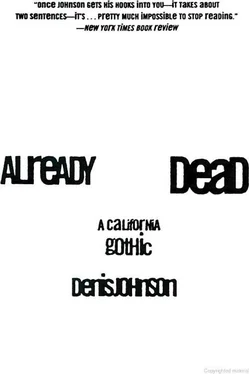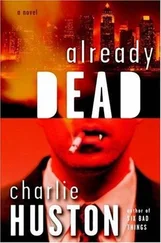34 / Denis Johnson
You can’t get rid of an anonymous package in a European airport.
The bomb squad won’t have it. They treat any such object as a disaster until it’s proven innocent. Even the trash cans won’t accommodate anything bigger than a wad of Kleenex. I had to sit on the toilet for half an hour, ripping open forty plastic packets, dissolving and flushing a fortune in cocaine.
As soon as I stepped onto American soil and cleared Customs I couldn’t understand, or even recall the force of, my vertigo in the Roman airport. I turned up in Harry Lally’s living room baffled, empty-handed except for the Sicilian attorney’s Japanese-made satchel, the lining of which I’d ruined by washing it out with toilet water. My failure stretched the fibers of our friendship. Okay, I don’t need to be flip: I can admit that first by my avarice, and then by a compounding cowardice, I earned myself a mortal enemy. And now I’m in a war.
And now the two hunters, and their dogs — clearly part of Harry Lally’s program for extracting reimbursement. He wants his cash. I don’t have cash. These men have been sent to get all I have that’s quickly convertible to cash — these twenty-six plants.
And I would say: take them! Take my watch, my rings, my fishing gear, my shoes and socks! But the plants aren’t mine . They belong equally to Clarence, the decorated killer.
I sat on a hump of earth and cradled the withered slip, moping and shrigging this deadborn of its fronds and looking out over the canyon.
At sunset the redwoods take on a coppery light. The leaves of the chinkapins are extinguished. The bigness of evening walks up the western slopes shivering, trailing a cool damp smell. Dusk comes earliest to these canyons, right out of the fissures in the earth. Shapes fade. The tide of the realm of dreams steals higher and higher up into my life. The wetness of nightmares this far inland…What a jerk! Feeling cornered, strangled, in the midst of this great peace! Only the greediest simpleton could have served himself this mess.
Now I’m terrified to hear the rasp, rising and dying, of tires on the gravel above. I’ve been an idiot. Anybody from around here knows the yellow Porsche. They all suspect I have a garden. Clarence would destroy me if I ever signaled, to use his demented combat parlance, his military phrasing, our position. Could be Harry Lally’s boys. Yes, “Harry Lally’s boys”—my life now spoken out of the side of the mouth in a gangster drawl.
Already Dead / 35
The dust of a vehicle showed around to the north, where Shipwreck Road switched back. They’d passed on.
“Melissa!” I screamed.
I was always afraid she’d vanish when my back was turned, off in some strange, fast car to a new affair.
Her voice drifted down from above me. “I don’t want to smoke any of your drugs because I’m already completely, wonderfully drunk!” I climbed up slowly, clinging to the occasional manzanita root, trying not to leave a trail of torn vegetation. When I stopped to rest, blotting the dusty sweat from my face with a bandanna, I heard her singing something in German, a folk song, maybe a fairy tale, something from very far away, where she lived always.
“Who was in that car? Who was in that car?” I cried breathlessly as I climbed up over the rim of the draw.
And there she was, my love: Melissa, sideways in the open door of the convertible, skirt blown up over her wan, destructible legs so that I wanted to weep. Everything. If these idiots force me I will trade it all for this woman.
“Look at me,” I ordered her.
She stared at me with a question, a smile, and a sweetness in the hesitation of her eyes.
“Don’t you see I’m going crazy?”
Nights are cold but we drive with the top down for the oxygen.
The cypresses on the cliffs high over the sea, dragged sideways by the wind over centuries into permanent blurs, whizzes, smears, seem to be part of a comic strip as we, drunk and dangerous, scream past in the heartstopping blue twilight. Offshore, the small lights of fishing-boats float in the dark: if you let them they’ll start symbolizing everything. I slow way down to light the reefer I’ve rolled, sucking in the smoke along with the damp clean ocean air. Melissa shakes her head. I jam the pedal.
Making love to Melissa is a dangerous blessing. It’s almost all I ever want to do. But when we’ve been on a party like today’s we generally forget to sleep together. I just drive her back to Acorn Road, to the woolly barnyard where she lives in her shocking trailer, and let it go at that. Anyway you won’t too often catch me entering that little home of hers. She takes in stray cats, the place is just a litter box.
She’s organic. I described her as drug-demented, but she eats only 36 / Denis Johnson
untreated vegetables and gets high only on natural herbs and plants, which include most wines and certain very expensive brands of scotch whiskey and tequila; sometimes also marijuana, when it’s baked into pastries — she refuses to take smoke into her lungs. She says she once had cancer of the liver but cured it with her mind.
I took her to the bottom of Acorn Road. The river mist met us less than halfway down. Not visible, but everywhere. “Good night, I’m going to sleep in my clothes,” she said, “and I hope I dream I’m not drunk,” and didn’t even kiss me.
When she’d gone into the trailer, one of the rounded, aluminum ones, a Silver Stream, I laid my head, which was suddenly full of sorrows, against the steering wheel. The night wind stirred through the treetops on the ridges. The distant commotion got the sheep bleating — a word that just doesn’t invoke the aged, human grief in their voices. Across the drive the owner of this property — the Sheep Queen, a Mediter-ranean-looking woman in her fifties, a nice enough person, but perfectly crazy — sat eating dinner in the kitchen of her ranch-style home, feeding bites from her plate to a big dog that loomed over her, standing up, as it were, with its forepaws on the table.
It’s sad to love a woman who won’t love back — it tears at a man — to love a woman who gives herself to others and uses his good intentions and sets his meaning aside. But I have a feeling that this stupid torment is the nearest thing going, for me, to what life is all about. I don’t just sense it dimly. The feeling is overpowering that this is the closest I can get to the truth behind the cloud.
Dreaming of one woman, I drive home to another.
Actually Winona wasn’t here lately. The ranch lay dark, the oaks like cut-outs against the smeary stars.
And actually Winona lived here alone. We’d been separated many months, beginning just a few weeks after the house was finished. But as Winona didn’t have a lover, at least nobody anybody knew of, I wasn’t in the way, I came and went, and in her absence I tended the stables, though I rarely crossed her threshold and this would be the first night I’d slept here all summer. She’d been travelling lately up and down the coast, visiting people she didn’t, in my opinion, actually know well enough to be visiting. On some kind of pilgrimage: Going Through Changes we call it in our region, where the Haight-Ashbury dialect flourishes unevolved.
Already Dead / 37
I parked the Porsche out of sight in the stables because I expected, sooner or later, a visit from Harry Lally’s boys. I hadn’t set foot in my own apartment since I’d heard they were in town. Eventually they’d locate me here. But I’d see them a mile off and be down the hill, walking into the forest — my father’s forest, where my brother lives — long before they reached the house. They’d never know for sure that I’d even been here, unless they searched through all the outbuildings and found the car.
Читать дальше












